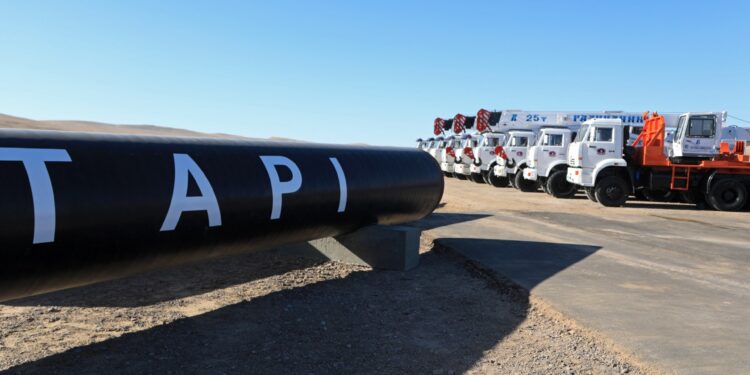cable- Afghanistan, which lies at the crossroads of ancient civilizations and was an important stop on the ancient Silk Road that connected China to Europe via Asia, is also the link between Central and South Asia. Central Asia, where countries are rich in energy resources such as gas and oil, and South Asia, where Pakistan and India suffer from energy shortages.
Kabul returns to its ancient civilized role through the inauguration of the TAPI gas pipeline project. Yesterday, Wednesday, the inauguration ceremony of this project took place on the border between Afghanistan and Turkmenistan, in the presence of the Prime Minister of the Taliban government, Mullah Hassan Akhund, the Deputy Prime Minister for Economic Affairs, Abdul Ghani Baradar, the Minister of Mines, and members of the government.
The Afghan part of the gas pipeline will officially start operating in Herat province. According to Zabihullah Mujahid, the Taliban government spokesman, the first phase of the project will start in Herat and he stressed that “the gas transfer will be for the benefit of the Afghan people.”
What is the Tabby project?
According to the Afghan Ministry of Mines website, the Turkmenistan-Pakistan-India-Afghanistan (TAPI) gas pipeline project (a name that refers to the initials of the participating countries) is considered one of the huge and promising regional projects for transporting gas between Central and South Asia.
The total length of the TAPI gas pipeline is 1,814 kilometers, passing through the provinces of Herat, Farah, Nimroz, Helmand and Kandahar in the Afghan part, with the length of the pipeline inside Afghan territory being 816 kilometers. In Afghanistan, the pipeline also runs along the Herat-Kandahar highway, then passes through Quetta and Multan in Pakistan, reaching the city of Fazilka in India.
The total cost of this project is 22 billion and 500 million dollars. It is expected to transport about 33 billion cubic meters of gas, of which Afghanistan will have 500 million cubic meters and the rest will be divided between Pakistan and India.
According to the spokesman of the Ministry of Mines and Petroleum, Humayun Afghan, all preparations have been made to start this project, which will provide direct and indirect job opportunities for thousands of people. He added that the work is expected to start practically starting yesterday, and the country will be able to obtain cheap and sustainable energy.
When did the project idea start?
The idea of the project dates back 30 years ago, during the period of the previous Taliban government in the 1990s, but wars and instability hindered the start of work in the Afghan part of it.
Negotiations between Turkmenistan and other countries continued for years, and in 2003 – with the support of the Asian Development Bank – India was invited to participate in this project, which it later agreed to. In 2016, an agreement was signed between the then Afghan President Hamid Karzai, the Presidents of Pakistan and Turkmenistan, and the Indian Minister of Petroleum.
How important is the project economically for Afghanistan?
Taliban Foreign Minister Mawlawi Amir Khan Muttaqi had earlier announced that Afghanistan would earn about $450 million annually in transit fees, during a preparatory meeting to discuss the start of work on the TAPI project.
According to the agreement between Kabul and Ashgabat, Afghanistan will receive 500 million cubic meters of gas annually for 30 years in the first ten years, one billion cubic meters in the second ten years, and two and a half billion in the third ten years. Thousands of job opportunities will also be provided for Afghans during the construction and reconstruction operations.
The Afghan Chamber of Commerce believes that the implementation of this project is very important in improving political and economic relations with the countries of the region.
Chamber board member Khan Jan Al-Kuzi hopes that work on this project will start immediately, saying, “We hope that there will be no more delays. The importance of this project is very high. I think there will be a very big change in our economy.”
On the other hand, this project will provide many job opportunities, especially in the construction process, pipe maintenance, technical and consulting services, and transportation.
What other projects are being implemented with the Tabby line?
Several other projects will be implemented along the pipeline, including a 500-kilowatt electricity transmission project between Turkmenistan and Pakistan via Afghanistan.
According to government statements, Kabul will receive up to $110 million in transit rights from electricity transmission, and three power substations will be built in Herat, Farah and Kandahar provinces.
Fiber optic cables will also be extended in the region to connect neighboring countries, and another project will be implemented along the gas pipeline, which is the railway line linking Pakistan and Turkmenistan via Afghanistan.
Will Tabby ease tensions in the region?
With the exception of Turkmenistan, which is known to be a neutral country in world affairs, Afghanistan, Pakistan and India have always been in a state of tension and short-term wars with each other in the past few decades.
These tensions have been particularly high between India and Pakistan. In addition to military skirmishes on the border between the two countries, their officials have frequently exchanged threats. Afghanistan has also witnessed severe tensions with Islamabad over the past few decades between most of the regimes that have ruled the two neighboring countries. But this project will work to link the common economic interests between these countries.
Historically, trade and economic relations have prevented several wars and established peace and stability, such as economic cooperation between Europe and Central Asian countries, and China’s relationship with regional countries, so this project may be a first step towards establishing stability in the tense region.
Perhaps the success of the TAPI project demonstrates Afghanistan’s influence in regional and international interactions and could be the beginning of other joint projects with other countries. Its success in this test will convince not only the region, but the world that it has the ability to be a reliable partner and friend.



